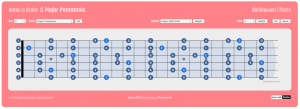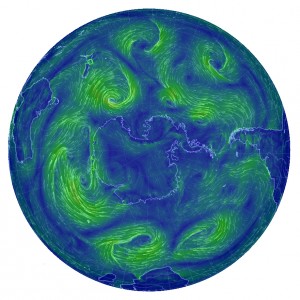There’s something called an “elevator pitch”, which is not a ball thrown in an elevator but a short sales pitch, a succinct description of a product. Those who know me probably recognise that while I may be articulate I’m not much of a salesman for my ideas.
So we’ve been making music for, what? almost four years, published hundreds of tracks on SoundCloud, have just finished producing our second CD, and we’ve yet to play a single live show. I do know we’re plenty ready to play live. So, mea culpa. I guess I’ve been more focused on playing and producing than marketing what we do. So again, mea culpa.
Who We Are
Barkhausen was originally set up as a collective, meaning that while it’s my band, I wanted to be able to bring other musicians into the mix now and then. And while some of the collaborations (such as those in Munich and Tokyo, see We’ve Been Busy) weren’t strictly “Barkhausen” in that we were all equal collaborators rather than they joining my band, the music we produced would still fit into what I think of as Barkhausen music. Very much so.
It occurs to me that this blog might not make clear who I am. I’m Murray Altheim, a Canadian who lived for many years in California, and after a few years in England moved to New Zealand in 2006 where I live in a small town about five minutes from the sea.
Since Barkhausen’s formation in 2015 there’s been one constant collaborator, my best mate Jason Tamihana-Bryce. Jason and I understand each other musically very well, and while there’s a tension between us due to our quite different temperaments and approaches to music, this tension has proven to be productive, not destructive. We also have a great time.
We’ve quite recently recruited a percussionist (who continues to insist he’s a drummer) named Karl Wagener. I’d been looking for someone who could, a bit like in a free jazz trio, provide an equal collaboration rather than a rhythm section, as I don’t want an underlying beat that would force us to follow it but rather, like Jason and I, someone who listens to what is happening and reacts with some sensitivity, contributed to the mix rather than attempting to (as a drummer) build an underlying rhythmic foundation. I think Karl and I have come to an understanding on this and the few sessions he’s played with us show real promise, i.e., I’m really enjoying what he’s bringing to the band.
What We Do
Over the past few years I’ve had the occasion to try to describe the music that Barkhausen makes. It’s not an easy answer. It doesn’t really fit conveniently into any genre, and while I don’t consider Barkhausen tracks showing up on top-40 radio, there are certainly venues where they could.
There’s some aspects of Free Jazz that make sense as a descriptive genre. Wikipedia’s page on the subject describes it as an attempt “to change or break down jazz conventions, such as regular tempos, tones, and chord changes” with a preoccupation “with creating something new”. Yes.
The Ambient section in the Shibuya Tower Records is an entire aisle, many thousands of CDs. There’s a lot of music there that isn’t very ambient (at least not in the Brian Eno Music For Airports mold), and that’s probably where Barkhausen CDs would end up. I find that rather dissatisfying, as I resist the “ambient” label, largely because the music we make is a lot more active than passive, and I think of ambient music as largely passive listening.
Our music is not challenging in the way that Noise or other Experimental music is challenging: it’s not hard to listen to. We don’t sound like Ornette Coleman or Stockhausen or Yoko Ono or something Fluxus-like, but perhaps a bit like the collaborations between David Sylvian and Holger Czukay (labeled “ambient”!), some of the more experimental works of Bill Frisell or Ryuichi Sakamoto, or David Torn. Yes, this is some name-dropping of some of my (and Jason’s) favourite musicians, and it’s undoubtable that we’ve been influenced by them. But we don’t sound like any of them. By design.
I do think what we do requires quite active listening. There’s a lot going on in The Length of Heaven (our last album), and that comes from both our process (more on that below) and my editing (again, more below).
As an erstwhile painter the term “Abstract” is one that I like (and I’ve sometimes used it to describe Barkhausen), but when I search online for “abstract music” I don’t hear anything like what I would think of as abstract music. As abstract painting runs the gamut from Rothko or Pollock (Noise) to Vasarely or Euan Uglow (Math), and a great deal more, it’s not very descriptive. Or helpful. Historically there’s been Absolute Music and Impressionist Music, but these terms are too overloaded.
So absent a genre what in the end I inevitably do with my elevator pitch is to fall back on how we make our music.
How We Do It
We do have a few rules:
- The music is entirely improvised.
- We don’t plan anything. I’m not sure if this is because we prefer to improvise freely or because we simply fail at planning. I think the latter. The closest to a plan we ever have is to agree to start a track following an agreed-upon key and mode. Where it might go from there is unclear…
- The recordings are made directly from our sessions, with no multi-tracking, overdubbing or post-production changes to the order or composition to what we played, except to trim sections that were repetitive, not-so-interesting, or didn’t otherwise contribute to the overall composition or feel of a track. You’re hearing what we played in the order we played it, just cleaned up. If the music sounds like it’s more than what two people might be able to create it’s because we have a lot of equipment.
Jason has a great talent for being able to quickly pick out the notes on a guitar fretboard for pretty much any key and mode, not just for Harmonic Minor, Pentatonic and Mixolydian but for many of the more obscure modes like the Enigmatic, Algerian and Hungarian Gypsy modes. I couldn’t possibly keep up with him in this regard, so if you see a laptop in front of me while I’m playing it’s not to play sounds but to give me some help with keys and modes using a web page Notes in Scale tool I wrote. This has also allowed us to explore some more unusual modes, such as Messiaen’s Modes of limited transposition.
The Technical Stuff
While it may not be obvious, Jason and I play guitars, sometimes basses. I also (rarely) bring a ukelele or banjo along. I sometimes use a cello bow, Jason several eBows. Jason usually has at least one guitar horizontal on a stand, ala Greg Malcolm. We have a lot of guitar pedals.
I’m generating two stereo pairs (four channels) into two Fender tube amps (a Princeton and a Vibrolux) and two DIs from a Eurorack Synth post-processor that runs into two Mackie 800 watt bass amps into two Gallien-Krueger 4×10 cabinets. Jason generates a stereo pair off of one Jansen tube amp and one Fender Princeton. Apart from the DIs everything is live mic’d.
When Karl is with us (or when I feel like adding some cymbals around my own rig), I’m creating a stereo pair as a submix off the percussion kit. The drums are Mapex, the cymbals mostly Zildjian Avedis.
We record live into a 16 channel Mackie analog mixer, mixing down to 6 channels (three stereo pairs) into a Zoom F4 digital recorder.
All post-production is done using Audacity on Ubuntu Linux. We send our work off to be mastered by Denis Blackham of Skye Mastering (yes, on the Isle of Skye), who does an absolutely lovely job.
…enough of that.
Why We Do It
The “why?” question… hmm. Compulsion? The answer comes back to that notion from the Free Jazz genre: the desire to create something new. I’ve played in Blues, Rock, and Rockabilly-Surf bands, and while that’s all fun (and this is no criticism of those genres) if I was going to go to all the trouble of recording and producing music, I frankly don’t think the world needs another blues band.
Nor could I possibly think I’m so fine a musician as to “compete” on musical technique (nor could I care to). I’m never going to be Stevie Ray Vaughn. But I learned from Bill Frisell that the best music a musician can create is one’s own. That notion of Bill’s was what actually got me to start Barkhausen.
So we’ve struck out for new territory with music that is our own. I hope you enjoy the ride enough to follow along…

